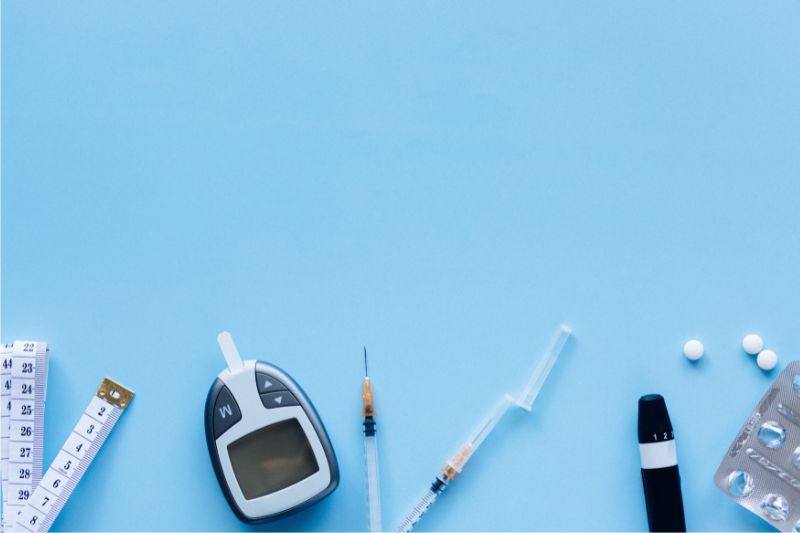Managing Diabetes for Life: 8 Helpful Tips

Living with diabetes can be a difficult and challenging experience. It is an ongoing process that requires constant monitoring of blood sugar levels, making dietary changes, and taking prescribed medications or insulin injections. Managing diabetes successfully over the long term involves understanding the disease, developing self-management skills, forming healthy habits, and making lifestyle modifications. In this article, we will discuss eight tips to help you manage your diabetes for life. We’ll cover topics such as nutrition education, physical activity planning, stress management techniques, and medication adherence strategies so that you have the tools needed to make informed decisions about your healthcare needs. By utilizing these tips in combination with regular checkups from your healthcare provider, you can ensure optimal control of your condition for years to come.
1. Take Proper Care Of Your Feet
The first and most important tip for managing diabetes is to take proper care of your feet. People with diabetes are more prone to developing foot complications, such as neuropathy, so it’s important to inspect your feet daily and keep them clean and dry. Furthermore, anything from orthopedic compression socks to special shoes can help protect your feet from injury and infection. Diabetes is also known to reduce blood circulation in the feet, so it’s important to check them regularly for swelling, discoloration, and sores. In general, any changes in the skin or color should be reported to your doctor right away.
2. Practice Good Nutrition Education
Good nutrition is essential for managing diabetes and preventing long-term health complications. Educating yourself on how food affects blood sugar levels will help you create a balanced diet tailored to your specific needs. A variety of healthy carbs, proteins, and fats should be included in your meal plan while avoiding sources of sugar like candy and soda. Additionally, counting carbohydrates at every meal can help you better understand how the foods you eat affect your blood sugar levels. Furthermore, consulting with a registered dietitian can help you create an individualized nutrition plan that takes into account your lifestyle, food preferences, and health goals.
3. Develop A Physical Activity Plan
Exercise is an important part of diabetes management as it helps to control blood sugar levels and reduce the risk of complications. Developing a physical activity plan is key to making sure you stay active and fit. This plan should include a range of activities such as walking, biking, swimming, or yoga that are tailored to your interests and ability level. It’s important to start slowly and gradually increase the intensity as your fitness level improves. Additionally, exercise is most effective when done regularly and should be a priority in your daily routine. Furthermore, your healthcare provider may also refer you to a certified exercise specialist who can help create an individualized plan for your unique needs.
4. Manage Stress Levels
Stress can have a huge impact on diabetes management as it can affect your blood sugar levels and overall health. It’s important to recognize the signs of stress and find ways to effectively manage them so that they don’t become overwhelming. Relaxation techniques such as yoga, meditation, and deep breathing can help reduce stress levels and improve your overall well-being. Additionally, counseling or support groups can provide a safe space to talk about any emotions you are feeling related to diabetes or other aspects of life. Lastly, it’s important to make sure you get enough sleep, as lack of sleep can lead to increased stress.
5. Monitor Blood Sugar Levels
Regularly monitoring your blood sugar levels is an important part of managing diabetes and preventing any serious health complications. Self-monitoring allows you to keep track of how certain food choices or activities affect your numbers so that adjustments can be made as needed. Additionally, it’s important to report any changes in blood sugar levels to your doctor so that they can be addressed in a timely manner. Lastly, keeping a log of these readings may also help you and your healthcare provider identify patterns or trends that need further attention. Blood sugar levels can spike unexpectedly, so make sure you always wear your medical alert bracelet and be prepared in the event of a hypoglycemic emergency.
6. Take Diabetes Medications As Prescribed
It’s important to take your diabetes medications as prescribed and in the correct dosage. Taking these medications consistently will help you maintain a healthy blood sugar level and prevent any long-term health complications. Additionally, it’s important to ask your healthcare provider about any potential side effects or interactions with other medications so that you can be prepared for them. Moreover, discussing any changes to your health or lifestyle with your doctor can help determine if any adjustments need to be made to your medication regimen. Conversely, never change or stop taking any medications without consulting with your healthcare provider first.
7. Schedule Regular Checkups With Your Healthcare Provider
Regular medical checkups are essential to managing diabetes as they allow your doctor to monitor your progress and adjust treatments if needed. Visiting your doctor at least once a year allows them to assess any changes in your health and lifestyle and make any necessary adjustments to your plan of care. Additionally, it’s important to discuss any new medications, supplements, or other treatments with your healthcare provider before trying them.
8. Stay On Top Of Your Medication Refills
It’s important to stay on top of your medication refills in order to ensure that you are taking them consistently and as prescribed. Additionally, if you have an insulin pump or any other device related to diabetes management, it’s essential to make sure they are stocked with the necessary supplies so that they can be used effectively. Lastly, make sure to talk to your doctor or pharmacist if you have any questions or concerns about refilling your medications. If possible, make sure you always have a spare, or extra on the side, just in case.
By following these eight tips for life-long diabetes management, you can help ensure that your condition is managed effectively and that you remain healthy. Remember that managing diabetes is a team effort between you and your healthcare provider and that it’s important to stay on top of your medical records, monitor your blood sugar levels, take medications as prescribed, attend regular checkups with your doctor, and stay on top of medication refills. Additionally, strategies such as stress management techniques and getting enough sleep can be beneficial in managing diabetes. With these tips in mind, you can be well on your way to managing diabetes and achieving a healthier lifestyle.











Leave a Reply